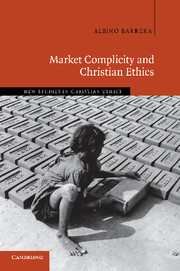General editor's preface
Published online by Cambridge University Press: 16 May 2011
Summary
After the near-collapse of the global financial system in 2008 this new addition to New Studies in Christian Ethics is very timely indeed and is written with great wisdom and clarity. Albino Barrera's previous contribution, Economic Compulsion and Christian Ethics (Cambridge, 2005), attracted some very fine reviews. His rigorous training in both economics and theology really has given him an extraordinarily authoritative voice (that and an ability to write clear prose), matching so exactly the aims of the series: namely, to promote studies in Christian ethics which engage centrally with the present secular moral debate at the highest possible intellectual level and, second, to encourage contributors to demonstrate that Christian ethics can make a distinctive contribution to this debate.
Economic Compulsion and Christian Ethics was a top-down book, looking at the way in which markets can create economic hardships for some individuals and communities (so-called pecuniary externalities), whereas Market Complicity and Christian Ethics is more a bottom-up book, examining the various ways in which we are all complicit in the harmful effects of our market choices (including, but certainly not exhausted by, pecuniary externalities). Together the two books offer an unparalleled account of current market economics from a perspective within Christian ethics to which all those engaging in this area responsibly in the future will need to respond.
- Type
- Chapter
- Information
- Publisher: Cambridge University PressPrint publication year: 2011



